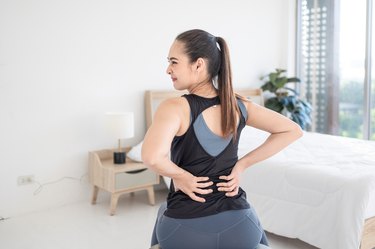
When it's "that time of the month," many people experience some degree of lower back pain before or at the onset of menstruation. This pain is often part of a normal period or premenstrual syndrome (PMS).
Sometimes, though, this painful symptom is a sign of a more serious issue.
Video of the Day
Video of the Day
Here, an ob-gyn explains the reasons your back hurts before your period and ways to relieve it.
1. Dysmenorrhea
Mild pain and cramping around the time of your period is normal and part of what's called dysmenorrhea, according to Johns Hopkins Medicine. It's caused by hormones called prostaglandins, which stimulate the uterus to contract. These contractions produce intermittent, cramping pain.
There are two types of dysmenorrhea — primary and secondary. According to Janine Barsoum, DO, a Pennsylvania-based ob-gyn, primary dysmenorrhea is a natural part of a menstrual cycle. It usually begins when a person first starts their period and lasts for as long as a person gets their menstrual cycle.
"Usually these cramps should improve over time as a person ages," Dr. Barsoum says.
Dysmenorrhea is usually felt in the lower part of the abdomen, but it can also occur in the lower back, hips or thighs.
Uterus contractions will start before a period begins, so back pain caused by dysmenorrhea can happen in the days leading up to a period. "Dysmenorrhea cramps usually go away by the second or third day of a period," Dr. Barsoum says.
Secondary dysmenorrhea is a different story. This type of dysmenorrhea is less common and generally appears later in life, per the Cleveland Clinic. Secondary dysmenorrhea is usually the result of an underlying medical disorder, such as endometriosis or noncancerous growths of the uterus called fibroids — more on those in a minute.
2. Premenstrual Syndrome (PMS)
PMS is a set of symptoms that occur before the start of your menstrual period, Dr. Barsoum says. It's normal to experience bloating, tender breasts, cramps, mood swings and lower back pain during this time.
Back pain with PMS, in particular, tends to be constant compared to intermittent cramping. The pain may come along with other PMS symptoms like anxiety, depression, difficulty sleeping, poor concentration, headaches and fatigue, per the Mayo Clinic. All often begin several days before your period begins.
But don't worry: Symptoms shouldn't last long. "Usually things improve [within the first few hours] that your period starts," Dr. Barsoum says.
And as for the cause of PMS? You can blame hormones for all of your inconvenient and intrusive symptoms.
One hormone called relaxin increases before your period, which can cause your back ligaments to relax. At that point, the lower back loses some of its natural support, which may result in pain, per the Cleveland Clinic.
Bloating and water retention are also symptoms of premenstrual syndrome, and both can contribute to lower back pain, too, according to Dr. Barsoum.
3. Endometriosis
Endometriosis is a condition in which tissue from the inner lining of the uterus — called the endometrium — grows in another location, according to the World Health Organization. The endometrial tissue may appear on the outer surface of the uterus or nearby organs, such as the ovaries, bladder or bowel.
Endometriosis is a chronic disease that can have painful lifelong symptoms and currently has no cure. Doctors are also not sure what causes it.
Symptoms of endometriosis depend on where the endometrial tissue is located, but pain in the lower back or lower abdomen is common, per the Mayo Clinic. Other symptoms include:
- Painful periods
- Painful sex
- Painful bowel movements and urination
- Excessive menstrual bleeding
- Infertility
Endometriosis should be formally diagnosed by your doctor, Dr. Barsoum says. As there is no cure, treatment will focus on managing symptoms so you're able to better navigate daily life.
4. Pelvic Inflammatory Disease (PID)
Pelvic inflammatory disease, also known as PID, is an infection of reproductive organs like the uterus, vagina and ovaries, per the Centers for Disease Control and Prevention (CDC). It's commonly caused by sexually transmitted infections (STIs) and can lead to symptoms like lower back pain, abdominal pain and abnormal vaginal discharge.
PID is a treatable condition, but the sooner it's diagnosed, the better and faster treatment can be, Dr. Barsoum says. If treatment is delayed, it can lead to serious complications and long-term problems like infertility and chronic pelvic pain, according to the Cleveland Clinic.
Tip
If you're diagnosed with PID, your sexual partner(s) should also receive treatment, per the Cleveland Clinic. Otherwise, you risk getting PID again once you resume sex.
5. Adenomyosis
Adenomyosis is a condition that happens when tissue that normally lines your uterus grows into the muscles of the uterus instead, per the Mayo Clinic. This can cause the uterus to swell, leading to painful, heavy periods, and it can be a reason for back pain during your menstrual cycle.
The cause of adenomyosis is unknown, and sometimes, no symptoms appear. For those that do experience symptoms, they can include:
- Heavy menstrual bleeding
- Severe cramping
- Chronic pelvic pain
- Painful sex
Adenomyosis usually resolves on its own as a person gets older, Dr. Barsoum says. But if heavy bleeding and pain is interfering with your life, she suggests seeing your doctor to discuss treatment options.
6. Uterine Fibroids
Uterine fibroids are usually more harmless than they sound. According to the Mayo Clinic, they are noncancerous and benign tumors that typically grow on and in the uterus during childbearing years.
In many cases, fibroids are symptom-less and go undetected until a pelvic exam is done. If symptoms do appear, they usually include:
- Heavy periods
- Back pain
- Pelvic pain and pressure
- Frequent urination
- Constipation
- Leg pain
Although they are normally harmless, uterine fibroids should not be ignored due to possible complications, Dr. Barsoum says. Small fibroids can often be left alone, but large fibroids may need to be surgically removed or treated with medication.
Back pain before and during your period may be unavoidable, depending on the cause behind it. But there are ways to minimize the discomfort while you wait for it to subside.
Dr. Barsoum suggests these strategies to relieve period back pain:
- Exercise: Physical activity during your period can help relieve back pain and other PMS symptoms. Try 30 minutes of light exercise, like a walk or yoga. These activities can also help reduce bloating and boost your mood while managing menstrual cycle discomfort.
- Heat therapy: Use a heating pad for instant relief from back pain and to soothe your menstrual cycle-related aches.
- Medication: Over-the-counter pain relievers like ibuprofen or Tylenol can help relieve back pain. For a natural alternative, try essential oils to help soothe symptoms.
- Avoid caffeine and alcohol: Pay attention to what you eat and drink. Take a break from caffeinated and alcoholic drinks while on your period, as both can worsen PMS symptoms.
- Consider birth control: For intense, prolonged back pain caused by your period, talk to your doctor about birth control options that can improve symptoms.
If back pain before and during your period interferes with your life or can't be relieved no matter what you try, visit your doctor to discuss treatment options.
You should also seek medical attention if you experience pain suddenly or notice signs of an underlying condition, Dr. Barsoum says.
See your doctor right away if you have severe pain in your back or abdomen, or your period is extremely heavy and makes you feel lightheaded or weak.
- Cleveland Clinic: "Dysmenorrhea (Menstrual Cramps)"
- Mayo Clinic: "Premenstrual syndrome (PMS)"
- World Health Organization: "Endometriosis"
- Cleveland Clinic: "Pelvic Inflammatory Disease"
- Centers for Disease Control and Prevention (CDC): "Pelvic Inflammatory Disease (PID) – CDC Basic Fact Sheet"
- Mayo Clinic: "Adenomyosis"
- Mayo Clinic: "Uterine Fibroids"
- Johns Hopkins Medicine: "Dysmenorrhea"
- U.S. News and World Report Health: "Janine M. Barsoum, DO"
- Cleveland Clinic: "Relaxin"
Is this an emergency? If you are experiencing serious medical symptoms, please see the National Library of Medicine’s list of signs you need emergency medical attention or call 911.


